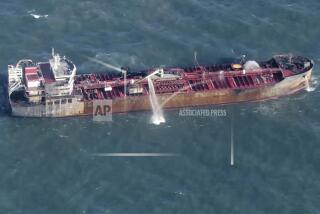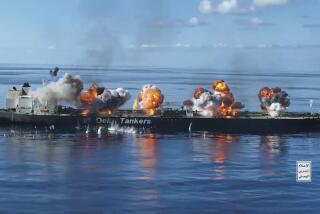Retire Aging Oil Tankers
- Share via
Nothing can prevent every maritime disaster, and even the “unsinkable” Titanic wasn’t. But the sinking of a tanker filled with 20 million gallons of oil off the coast of Spain this week and the potential environmental catastrophe that is unfolding as a result could have and should have been prevented.
The Prestige was a type of single-hull tanker mass-produced by Japan more than a quarter-century ago. No one should be surprised that it cracked open during a storm, nor should anyone be shocked when the next of the many tankers of its kind churning the oceans cracks open.
Hundreds of pre-1980 Japanese-built oil tankers remain in operation. Single-hull tankers are said to make up about half of the world’s 10,000-ship fleet of oil carriers.
The Erika, another single-hull tanker of the same technically unsophisticated generation, sank off the coast of Brittany in 1999. The Braer sank in 1993, and the Aegean Sea sank the year before.
The frequency of these disasters should produce international outrage and pressure for stricter rules intended to phase out single-hull tankers.
Nobody says double-hull tankers are perfectly safe, but at least they make oil spills less common and less disastrous. So could regulations to speed up the mothballing of old ships, which begin to wear out and become dangerous after about 20 years. Yet, the Prestige, which was loaded in Latvia and bound for Singapore, was cleared to sail until 2005, when it would have been almost 30 years old.
If the sunken Prestige releases its entire cargo into the water, the incident will rank 14th among tanker spills. But it won’t be easy to establish responsibility for the damage.
Like many ships today, the vessel is covered by a corporate veil that makes it hard for authorities to nail down who is to pay for damages. The Prestige was owned by a Liberian-registered firm, registered in the Bahamas by a Greek management firm, chartered by a Swiss-based Russian oil trader and classed as seaworthy by the American Bureau of Shipping.
The Prestige sank a dozen miles from the Galician Bank, an area rich with coral, sponges, fish and other kinds of marine life. Once the cleanup is done, the United Nations International Maritime Organization should designate the Galician Bank a “particularly sensitive sea area.” That would restrict shipping traffic and protect this environmentally spectacular place from even shipwrecks that are unavoidable.
More to Read
Sign up for Essential California
The most important California stories and recommendations in your inbox every morning.
You may occasionally receive promotional content from the Los Angeles Times.












